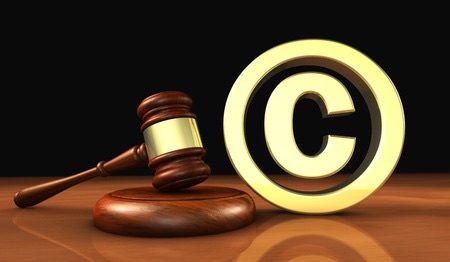 In January, legal analytics firm Lex Machina released a copyright litigation report for 2016 which delivers findings on notable trends in U.S. copyright cases from the beginning of 2009 up through the third quarter of 2016. This report, Lex Machina’s second such major survey of the U.S. copyright lawsuit landscape, does a good job identifying the important whos, whats and wheres which are trending in U.S. district courts.
In January, legal analytics firm Lex Machina released a copyright litigation report for 2016 which delivers findings on notable trends in U.S. copyright cases from the beginning of 2009 up through the third quarter of 2016. This report, Lex Machina’s second such major survey of the U.S. copyright lawsuit landscape, does a good job identifying the important whos, whats and wheres which are trending in U.S. district courts.
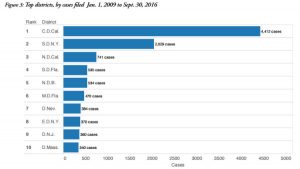 Venue statistics in the Lex Machina report show that copyright cases are filed in districts which include cities which are centers of commerce for the industries which file the most copyright suits. From January 1st, 1999, to September 30th, 2016, the U.S. District Court for the Central District of California (C.D. Cal.) received 4,412 copyright suits, just over a quarter of all copyright cases filed in U.S. district courts during that time. Given that Los Angeles is an industrial center for many sectors, including the music, publishing, textile and fashion industries filing the most copyright suits, this result isn’t too surprising. The U.S. District Court for the Southern District of New York (S.D.N.Y.), which includes New York City, received 2,029 copyright suits during the survey period, which represents 11.7 percent of all copyright suits filed.
Venue statistics in the Lex Machina report show that copyright cases are filed in districts which include cities which are centers of commerce for the industries which file the most copyright suits. From January 1st, 1999, to September 30th, 2016, the U.S. District Court for the Central District of California (C.D. Cal.) received 4,412 copyright suits, just over a quarter of all copyright cases filed in U.S. district courts during that time. Given that Los Angeles is an industrial center for many sectors, including the music, publishing, textile and fashion industries filing the most copyright suits, this result isn’t too surprising. The U.S. District Court for the Southern District of New York (S.D.N.Y.), which includes New York City, received 2,029 copyright suits during the survey period, which represents 11.7 percent of all copyright suits filed.
As Lex Machina data scientist Brian Howard notes, this is a different kind of concentration of cases than is seen in the patent sector of intellectual property litigation. “In the patent world, we see half of all litigation in two courts,” Howard said, referencing the U.S. District Court for the Eastern District of Texas (E.D. Tex.) and the U.S. District Court for the District of Delaware (D. Del.). Howard added that copyright cases were more evenly distributed among district courts receiving lower amounts of lawsuits, whereas some district courts received a sparse number of patent suits in recent years.
Plaintiffs filing the most copyright cases in recent years include music copyright licensing firm Broadcast Music, Inc., which filed 1,124 copyright cases between 2009 and 2016, and music publisher Sony/ATV, which was second place with 623 cases during the survey period. Music publisher Warner-Tamerlane filed 462 copyright suits, followed by fashion designer Coach Services (441 cases) and music publisher Songs of Universal (438 cases). Textile firms are also increasing their copyright litigation activities; four textile plaintiffs filed a combined 67 copyright cases in 2011, rising to 139 cases through the first nine months of 2016.
The most active defendants in copyright lawsuits include department store chain Ross Stores, Inc. (NASDAQ:ROST), which was named as a defendant in 276 cases. Following Ross Stores are a series of retailers: TJX Companies, Inc. (NYSE:TJX), named a defendant in 123 cases; Amazon.com Inc. (NASDAQ:AMZN), a defendant in 84 cases; Burlington Coat Factory (NYSE:BURL), a defendant in 74 cases; and Rainbow USA Inc., a defendant in 66 cases. Except for Amazon, these are primarily off-price department stores offering brand name goods at discounted prices. Music publishers like Universal Music Group, Inc. (65 suits) and education publishers like Pearson Education, Inc. (NYSE:PSO) (50 suits) are also among the top defendants in copyright cases.
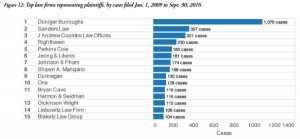 The top law firm representing plaintiff in copyright cases over the past few years is Doniger Burroughs, a firm which has represented plaintiffs in 1,079 cases between 2009 and 2016, many of which were filed by textile and fabric companies. Doniger Burroughs far outpaces the second place firm representing copyright plaintiffs, Sanders Law, which represented plaintiffs in 357 copyright cases. Law firms representing defendants shared a much more even proportion of the caseload with Call & Jensen representing defendants in the most cases between 2009 and 2016 (205), followed by Davis Wright Tremaine (151 cases) and Greenberg Traurig (121 cases).
The top law firm representing plaintiff in copyright cases over the past few years is Doniger Burroughs, a firm which has represented plaintiffs in 1,079 cases between 2009 and 2016, many of which were filed by textile and fabric companies. Doniger Burroughs far outpaces the second place firm representing copyright plaintiffs, Sanders Law, which represented plaintiffs in 357 copyright cases. Law firms representing defendants shared a much more even proportion of the caseload with Call & Jensen representing defendants in the most cases between 2009 and 2016 (205), followed by Davis Wright Tremaine (151 cases) and Greenberg Traurig (121 cases).
Lex Machina’s copyright litigation report also identifies trends on findings, judgments and case resolutions, like the fact that fair use findings are a much more likely conclusion when resolving a case through pretrial summary judgment; cases which reach trial are much more likely to end with a finding of no fair use. Most copyright cases resolving between 2009 and 2016 reach either default judgments (1,536 cases) or summary judgement (900 cases). Default judgments almost always result in a finding of infringement, which is the conclusion of 98.6 percent of default judgements. From another angle, default judgments were also the most likely result of cases which resolved in a finding of infringement, accounting for 66.2 percent of all judgments finding infringement in copyright suits. As Howard notes, default judgment rates are much higher in copyright litigation than patent litigation. “When you think about it, it’s a lot easier to manufacture something in a fly-by-night operation that runs afoul of copyright or trademark laws than patent laws,” he said. “Often it’s internationals who choose not to come to the U.S. and fight the suit, or at a minimum decides to ignore the court process. That’s a lot easier to do when you’re a small-time operator instead of large manufacturing base infringing a patent.”
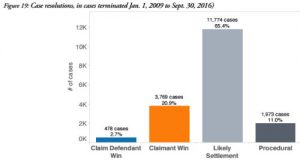 Findings of infringement were also the result of 82.1 percent of the 559 consent judgments reached during the survey period. Summary judgements tend to result in findings of either no infringement (41.3 percent of summary judgment findings) or infringement (35.4 percent). Although claimants win a much larger share of cases than claim defendants, 3,769 cases compared to 478 cases, the most likely case resolution outcome were likely settlements, which accounted for 11,774 cases, just under two-thirds of all case resolutions in copyright cases terminated between 2009 and 2016.
Findings of infringement were also the result of 82.1 percent of the 559 consent judgments reached during the survey period. Summary judgements tend to result in findings of either no infringement (41.3 percent of summary judgment findings) or infringement (35.4 percent). Although claimants win a much larger share of cases than claim defendants, 3,769 cases compared to 478 cases, the most likely case resolution outcome were likely settlements, which accounted for 11,774 cases, just under two-thirds of all case resolutions in copyright cases terminated between 2009 and 2016.
Timing statistics in the Lex Machina report indicate that plaintiffs are granted preliminary injunctions at a median of 3.9 months, whereas the median timing for permanent injunction grants is 14.4 months. When temporary restraining orders (TROs) are granted, the median timing to a TRO is eight days. Howard noted that the longer timing on permanent injunction grants may be an indication that more cases resolve before a permanent injunction is needed, especially in cases where plaintiffs decide to settle after receiving a preliminary injunction.
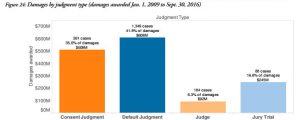 Despite the multi-million dollar verdicts sought by plaintiffs in copyright cases, only 9 percent of cases terminated between 2009 and 2016 resulted in compensatory damages, and only 1.5 percent of cases in which damages were awarded through judgments other than consent or default judgments. $608 million worth of damages, 41.8 percent of damages awarded in all copyright cases, were awarded via default judgments, indicating that a large amount of damages awards may not even be collectable from parties which refuse to respond to court procedures. $509 million in damages have been awarded via consent judgment, $245 million has been awarded after jury trial and a total of $92 million in damages were awarded as a result of a judicial action. The plaintiff receiving the greatest total damages from all copyright suits between 2009 and 2016 is entertainment merchandise and licensing firm Disney Enterprises, Inc., which received $296.3 million in damages awards over the course of 50 cases. When removing default and consent judgments, however, the top plaintiff award belongs to computer tech firm Oracle Corporation (NYSE:ORCL), which won a single award of $76.8 million in damages via jury trial. The most common type of damages awarded in copyright cases resolved through default judgments was statutory damages for willful copyright infringement, accounting for a total of $373 million in damages awarded. Willful copyright infringement damages were high across the board, accounting for $25.7 million in damages awarded from consent judgements, $42.5 million in damages awarded from judicial actions and $51.9 million in damages awarded via jury trials. Actual damages & infringer’s profits were relatively lower except in the case of jury verdicts, which accounted for $156.6 million in awarded damages.
Despite the multi-million dollar verdicts sought by plaintiffs in copyright cases, only 9 percent of cases terminated between 2009 and 2016 resulted in compensatory damages, and only 1.5 percent of cases in which damages were awarded through judgments other than consent or default judgments. $608 million worth of damages, 41.8 percent of damages awarded in all copyright cases, were awarded via default judgments, indicating that a large amount of damages awards may not even be collectable from parties which refuse to respond to court procedures. $509 million in damages have been awarded via consent judgment, $245 million has been awarded after jury trial and a total of $92 million in damages were awarded as a result of a judicial action. The plaintiff receiving the greatest total damages from all copyright suits between 2009 and 2016 is entertainment merchandise and licensing firm Disney Enterprises, Inc., which received $296.3 million in damages awards over the course of 50 cases. When removing default and consent judgments, however, the top plaintiff award belongs to computer tech firm Oracle Corporation (NYSE:ORCL), which won a single award of $76.8 million in damages via jury trial. The most common type of damages awarded in copyright cases resolved through default judgments was statutory damages for willful copyright infringement, accounting for a total of $373 million in damages awarded. Willful copyright infringement damages were high across the board, accounting for $25.7 million in damages awarded from consent judgements, $42.5 million in damages awarded from judicial actions and $51.9 million in damages awarded via jury trials. Actual damages & infringer’s profits were relatively lower except in the case of jury verdicts, which accounted for $156.6 million in awarded damages.
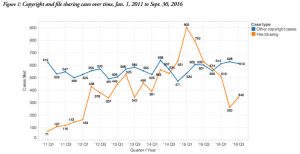 The copyright litigation report also breaks out a significant sector of copyright litigation which has seen some unique trends: file sharing cases which involve copyright infringement claims based upon peer-to-peer file sharing charges targeting anonymous defendants, IP addresses or Internet service providers. In the first quarter of 2015, a peak of 902 file sharing cases were filed, far outpacing the 534 other copyright cases filed that quarter. In 2016’s third quarter, however, only 340 file sharing cases were filed as opposed to 613 other copyright cases. As a percentage of total copyright cases, file sharing cases have declined from a peak of more than 60 percent in 2015’s first quarter down to less than 40 percent in 2016’s third quarter. “File sharing cases are in decline, but plaintiffs have not gotten to the point where they’re ready to throw in the towel,” Howard said.
The copyright litigation report also breaks out a significant sector of copyright litigation which has seen some unique trends: file sharing cases which involve copyright infringement claims based upon peer-to-peer file sharing charges targeting anonymous defendants, IP addresses or Internet service providers. In the first quarter of 2015, a peak of 902 file sharing cases were filed, far outpacing the 534 other copyright cases filed that quarter. In 2016’s third quarter, however, only 340 file sharing cases were filed as opposed to 613 other copyright cases. As a percentage of total copyright cases, file sharing cases have declined from a peak of more than 60 percent in 2015’s first quarter down to less than 40 percent in 2016’s third quarter. “File sharing cases are in decline, but plaintiffs have not gotten to the point where they’re ready to throw in the towel,” Howard said.
As has been noted in past Lex Machina litigation reports, a great majority of the activity in file sharing lawsuits is attributable to the legal actions of Malibu Media, LLC, a producer of adult erotic films. Malibu Media is responsible for 5,878 file sharing cases filed between 2009 and 2016, including 660 cases filed during the first nine months of 2016. The second-largest docket of file sharing cases filed by a single party comes from Dallas Buyers Club, LLC, which only filed 320 such cases between 2009 and 2016. No single law firm has represented a plaintiff in more than 1,200 file sharing cases, so it appears that Malibu Media has split its legal filing activities among multiple law firms. 7,984 file sharing cases, or 90.4 percent of such cases, resolved in a likely settlement with only 4.1 percent of cases reaching a claimant win and 5.5 percent of cases reaching a procedural conclusion. For its troubles, Malibu Media has earned a total of $5.1 million in damages awards between 2009 and 2016, the overwhelming majority coming through default judgments. In fact, damages awarded in default judgments resulting from file sharing suits make up 88.9 percent of all damages awarded in file sharing cases.

![[IPWatchdog Logo]](https://ipwatchdog.com/wp-content/themes/IPWatchdog%20-%202023/assets/images/temp/logo-small@2x.png)


![[Advertisement]](https://ipwatchdog.com/wp-content/uploads/2024/04/Patent-Litigation-Masters-2024-sidebar-early-bird-ends-Apr-21-last-chance-700x500-1.jpg)

![[Advertisement]](https://ipwatchdog.com/wp-content/uploads/2021/12/WEBINAR-336-x-280-px.png)
![[Advertisement]](https://ipwatchdog.com/wp-content/uploads/2021/12/2021-Patent-Practice-on-Demand-recorded-Feb-2021-336-x-280.jpg)
![[Advertisement]](https://ipwatchdog.com/wp-content/uploads/2021/12/Ad-4-The-Invent-Patent-System™.png)







Join the Discussion
One comment so far.
Inventor Woes
February 16, 2017 09:38 pmYou can’t stop file sharing. It’s like the hydra in ancient Greek mythology. I don’t know why people bother trying.